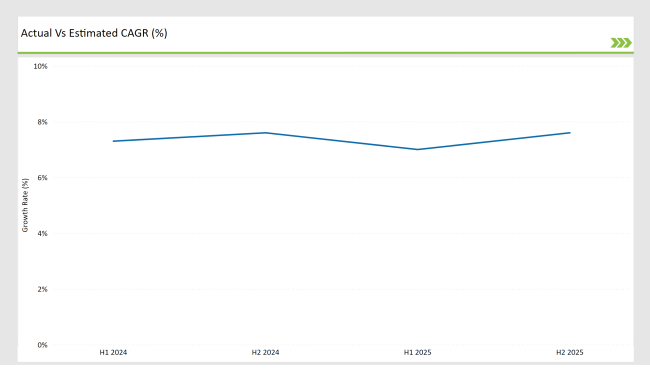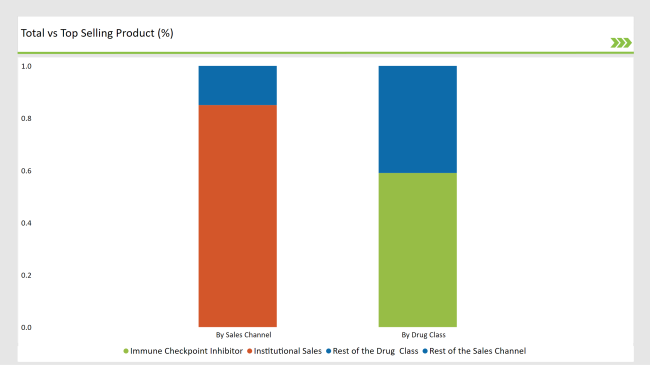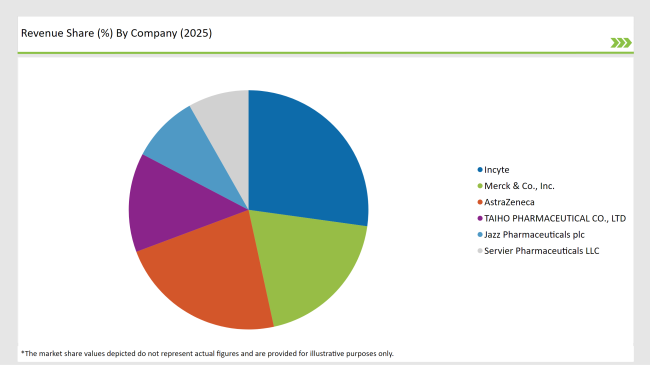The Germany biliary tract cancers treatment market is forecasted to attain USD 18.5 million by 2025, expanding at 8.7% CAGR to USD 42.5 million by 2035.
| Attributes | Values |
|---|---|
| Industry Size (2025E) | USD 18.5 million |
| Industry Value (2035F) | USD 42.5 million |
| CAGR (2025 to 2035) | 8.7% |
The Germany biliary tract cancers (BTCs) treatment market is also anticipated to develop wonderfully in the next years by improving healthcare infrastructures, focusing on cancer as a critical area in awareness, and the increasing requirement for innovative therapies targeted at those specific areas of cancer.
For the year 2025, the Germany market will contribute substantially toward the global market for BTC treatments, which should reach USD 18.5 million. Through 2035, the CAGR will remain steady at 8.7%, highlighting the market's robust expansion trajectory.
The major growth drivers in the Germany biliary tract cancers (BTCs) treatment market remain the increasing incidences of BTCs among the geriatric population and increased lifestyle disease prevalence.
In addition, awareness of the risk factors associated with BTC is fast growing, hence translating to an increase in early diagnosis and treatments. Additionally, the growing trend of personalized medicine-most recently by targeted therapies such as FGFR inhibitors and immunotherapies-is providing increasingly successful treatments that result in better outcomes for patients and increased survival rates.
The steadily increasing demand for cost-effective accessible treatments has turned out to be mainly high priority in underrepresented regions, where advanced therapies can make all the difference.
Cooperation between the biggest pharmaceutical players has become a new main market trend, since this cooperation focuses rather on accelerating novel therapy development, conducting thorough clinical trials, and ensuring cost-effectiveness in the solutions.
These strategic alliances will enable improvements in the accessibility and effectiveness of BTC treatments, encouraging the development of the Germany healthcare sector for BTCs.
Explore FMI!
Book a free demo
The table below provides a more detailed comparative assessment of the variation in CAGR over six months between the base year, 2023, and the current year, 2024, specifically for the Germany biliary tract cancers (BTCs) treatment market.

H1 signifies period from January to June, H2 Signifies period from July to December
The biliary tract cancers (BTCs) treatment sector for the Germany market will be growing at 8.9% CAGR for the first half of 2023 but then increase to 9.1% for H2 of 2023.
For 2024, it is expected to decline to 8.7% for H1 but is believed to rise up to 9.4% in H2. The pattern reveals a drop of 21 basis points from the first half of 2023 to the first half of 2024, but in the second half of 2024, it registers higher by 34 basis points against the second half of 2023.
This is a dynamic and fast-changing Germany biliary tract cancers (BTCs) treatment market, largely influenced by regulations, consumer trends, and improvements in biliary tract cancers (BTCs) treatment. Breaking up semestrially also proves crucial for businesses that chart their strategies in alignment with the trends of growth and broach through waters of complexities.
| Date | Development/M&A Activity & Details |
|---|---|
| March 2024 | Collaboration: In March 2024, Jazz Pharmaceuticals collaborated with various German research hospitals to test its new drug candidate on BTC and analyze the efficacy of its product for combination therapies for higher rates of tumor responses. |
| 2024 | Clinical Trial: Daiichi Sankyo Initiated an early 2024 pivotal Phase 3 clinical trial in Germany for its experimental FGFR inhibitor, DS-1205 in patients with cholangiocarcinoma, a type of BTC. The drug is to be assessed for efficiency among advanced cases and those refractory BTC. |
| January 2024 | Regulatory Approval: Hutchmed, in January 2024, received approval from the regulatory authorities in Germany over its innovative treatment for BTC, HMPL-523, a selective Syk inhibitor. This represents an opportunity to start treating advanced BTC patients in Germany with solidifying Hutchmed's role in the German BTC treatment landscape. |
Increased adoption of targeted therapies
In Germany, the growth of precision medicine and targeted therapies is driving the expansion of the BTC treatment market. Advanced therapies, such as FGFR inhibitors and immune checkpoint inhibitors, provide more personalized treatment options, improving survival rates and quality of life for patients.
These therapies are gaining momentum because they can target specific genetic mutations, which are often associated with BTC. With the increase in number of treatment available, the market is likely to grow to new heights with enhanced care and outcome for patients in the clinical side.
Government Support for Cancer Treatment Initiatives
Germany's concentration on healthcare in the area of cancer treatment keeps pushing the growth of the BTC market. To improve funding toward research and furthering cancer research, the government made several initiatives including those to give easier access toward state-of-art treatments for the patients suffering with BTC.
More of these modern treatments are able to reach into the patient pools now. The government’s emphasis on early diagnosis and prompt treatment through healthcare infrastructure improvements is also enhancing market growth, allowing for timely and effective care for BTC patients
% share of Individual categories by Drug Class and Sales Channel in 2025

Targeted Therapy records significant surge in Germany Biliary Tract Cancers (BTCs) Treatment by Drug Class
Targeted therapies like FGFR and IDH1 inhibitors are significant in improving survival rates and quality of life, as they are treatments targeted at specific genetic mutations. Their adoption in Germany has been increasing as a result of the development of biomarkers that can be identified and genetic profiling, which enable more personalized and effective treatment options for BTC patients.
The integration of targeted therapies with immunotherapies is further amplifying their impact, especially in the management of advanced-stage BTC and in the ongoing clinical trials. This approach is helping to address unmet clinical needs and improve treatment outcomes.
The treatment market for BTCs in Germany is dominated by institutional sales, mainly because hospitals and cancer centers conduct most of the BTC treatments. These health institutions are the principal deliverers of advanced therapies and invest in cutting-edge technologies and diagnostic tools for the better care of patients.
The growing incidence of BTCs along with the need for innovative therapeutic alternatives is thus propelling demand through institutional channels of sale. Strong health infrastructure coupled with well-trained oncologists make these sophisticated treatments well adopted over time.
Germany biliary tract cancers (BTCs) treatment market can be considered to be moderately fragmented due to its presence of multinational companies with regional players, and the clients compete in a dynamic landscape.
The leaders included Incyte, Merck & Co., Inc. and AstraZeneca. leading the market through their advanced technologies and significant service networks along with robust customer relationships. Regional players have started gaining market shares by offering niche solutions to some specific sectors such as emergency response and rural healthcare.
2025 Market share of Germany Biliary Tract Cancers (BTCs) Treatment suppliers

Note: above chart is indicative in nature
The competitive landscape is based on innovation and customization. The leaders are spending significantly in R&D to make biliary tract cancers (BTCs) treatment more efficient, mobile, and environmentally friendly in order to comply with stringent regulations and respond to the changing consumer demand for safe, fast, and environmentally friendly sterilization products.
Strategic partnerships and acquisitions are also transforming the market landscape. This will allow companies to be able to expand their product offerings and also their geographical presence. The mix of established multinational corporations and agile regional companies creates a vibrant and competitive environment in the Germany biliary tract cancers (BTCs) treatment market.
The Germany biliary tract cancers (BTCs) treatment market will grow at 8.7% CAGR by 2035.
By 2035, the sales value of the Germany biliary tract cancers (BTCs) treatment industry is expected to be 42.5 million.
Key growth factors for Germany biliary tract cancers (BTCs) treatment markets include increased interest in early diseases detection and prevention, improved surgical and medical procedures.
Prominent players in the Germany biliary tract cancers (BTCs) treatment manufacturing include Incyte, Merck & Co., Inc., AstraZeneca, TAIHO PHARMACEUTICAL CO., LTD, Servier Pharmaceuticals LLC, Jazz Pharmaceuticals plc, Relay Therapeutics, DAIICHI SANKYO COMPANY, LIMITED., BeiGene, Ltd., HUTCHMED and Exelixis, Inc.
The industry includes various type such as targeted therapy (FGFR2 inhibitors, IDH1 inhibitor, HER2-targeted agents) and immune checkpoint inhibitor (pembrolizumab, durvalumab).
In terms of route of administration, the industry is segregated into- oral and intravenous.
In terms of line of therapy, the industry is segregated into- first-line treatment and second-line treatment.
In terms of sales channel, the industry is segregated into- institutional sales and retail sales.
Pharmacy Automation Market Trend Analysis Based on Product, End-Use, and Regions 2025 to 2035
United States Spine Pain Market Trend Analysis Based on Product, Pain, End-User, and Regions 2025 to 2035
Continuous Glucose Monitoring Device Market – Demand & Future Trends 2025 to 2035
Disposable EEG Electrode Market Trends – Demand & Growth 2025 to 2035
Drug Discovery Informatics Market Trends - Growth & Future Outlook 2025 to 2035
CRISPR and Cas Gene Market Report – Growth, Trends & Future Outlook 2025 to 2035

Thank you!
You will receive an email from our Business Development Manager. Please be sure to check your SPAM/JUNK folder too.